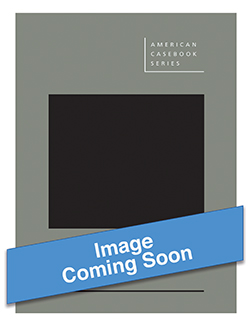- Home
- Toxic and Environmental Torts: Cases and Materials
Toxic and Environmental Torts: Cases and Materials
The Second Edition of this casebook provides an integrated approach to private and public law responses to toxic insults to individuals and to the environment. The book explores: the ability of various legal theories to resolve toxic tort cases, the use of various branches of science to address the question of causation, the unique features of toxic tort remedies in the workplace, the role of public law, both in controlling risk and its interaction with private law, special damage issues that arise in toxic cases such as the right to medical monitoring, the insurance issues that arise in toxic tort cases, and the complex legal environment (bankruptcy, multidistrict litigation, class actions) in which toxic tort cases are often litigated. The casebook stands alone as an upper-level introduction to the ever-expanding role of toxic tort and environmental law regulation and litigation.
Imprint: West Academic Publishing
Series: American Casebook Series
Publication Date: 07/17/2024
Related Subject(s): Torts, Torts-Advanced
Robin Kundis Craig, University of Southern California Gould School of Law
Steve C. Gold, Rutgers Law School-Newark
Michael D. Green, Washington University School of Law
Andrew Klein, Wake Forest University School of Law
Joseph Sanders, University of Houston Law Center
CasebookPlus™
This title is available in our CasebookPlus format. CasebookPlus provides support beyond your classroom lectures and materials by offering additional digital resources to you and your students. Anchored by faculty-authored formative self-assessments keyed to our most popular casebooks, CasebookPlus allows students to test their understanding of core concepts as they are learning them in class – on their own, outside of the classroom, with no extra work on your part. CasebookPlus combines three important elements:
- A new print or digital casebook
- Access to a downloadable eBook with the ability to highlight and add notes
- 12-month access to a digital Learning Library complete with:
- Chapter questions keyed to the casebook
- Black Letter Law questions (available in select subjects)
- Subject area review questions for end of semester use
Leading digital study aids, an outline starter, and audio lectures in select subjects
Students can still utilize CasebookPlus digital resources if they’ve purchased a used book or are renting their text by purchasing the Learning Library at westacademic.com.
With CasebookPlus, you can customize your students’ learning experience and monitor their performance. The quiz editor allows you to create your own custom quiz set, suppress specific quiz questions or quiz sets, and time-release quiz questions. Additionally, the flexible, customized reporting capability helps you evaluate your students’ understanding of the material and can also help your school demonstrate compliance with the new ABA Assessment and Learning Outcomes standards.
- Incorporates discussions of various provisions in the Third Restatement of Torts throughout the book.
- Adds a section on breach of warranty as a remedy and updates the ongoing efforts to use private and public nuisance law to address toxic injuries.
- Updates materials on specific and general causation and adds a new section on the role of genetics, genomics and molecular epidemiology in the proof of specific causation.
- Adds new material on efforts to use market share liability and similar remedies in the multi-party context.
- Discusses the latest developments in the admissibility of expert testimony, including recent revisions to Federal Rule of Evidence 702.
- Provides updated materials on numerous federal statutes, including RCRA and CERCLA, FIFRA, TSCA (with materials on the 2016 TSCA reforms), and the FDCA.
- Adds a “take-home asbestos” case in the discussion on the scope of liability.
- Substantially reworks the discussion of complex litigation, now with a focus on the importance of MDL proceeding in the resolution of mass toxic torts as well as a new discussion of issue preclusion and collateral estoppel.
- Throughout, replaces a number of principal cases with more recent court opinions reflecting current law or contemporary issues.
- Incorporates discussion of emerging contaminants such as PFAS at appropriate points.
Learn more about this series.
Access Denied
Law School Faculty - Sign in or Create an Account to access this content. Law faculty who have created an account can sign in after receiving email notification that registration has been approved. Email accountmanager@westacademic.com or call 800-313-9378 for assistance.
Other Higher Education Faculty who wish to access digital review copies or teaching resources should contact their West Academic Account Manager at college@westacademic.com or 800-360-9378.
Adopters Only
This content is intended for adopters only. Sign in or Create an Account to access this content. Law faculty who have created an account can sign in after receiving email notification that registration has been approved. If you are an adopter who is unable to access this content after signing in, contact your account manager for assistance at accountmanager@westacademic.com or call 800-313-9378 for assistance.
Access Denied
Sign in or Create an Account to access this content. Faculty who have created an account can sign in after receiving email notification that registration has been approved. Contact us for assistance.
Law School Faculty: email accountmanager@westacademic.com or call 800-313-9378.
Other Higher Education Faculty: email college@westacademic.com or 800-360-9378.
Access Denied
Higher education faculty who wish to view this document should contact their West Academic Account Manager at college@westacademic.com or 800-360-9378.
